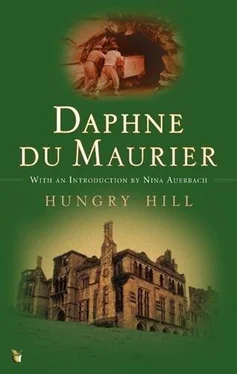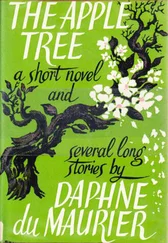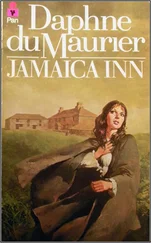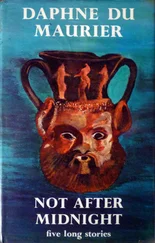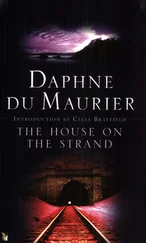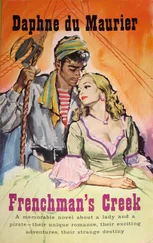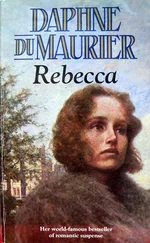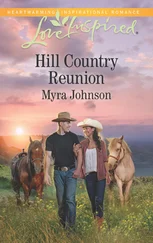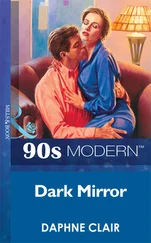Daphne du Maurier - Hungry Hill
Здесь есть возможность читать онлайн «Daphne du Maurier - Hungry Hill» весь текст электронной книги совершенно бесплатно (целиком полную версию без сокращений). В некоторых случаях можно слушать аудио, скачать через торрент в формате fb2 и присутствует краткое содержание. Жанр: Историческая проза, на английском языке. Описание произведения, (предисловие) а так же отзывы посетителей доступны на портале библиотеки ЛибКат.
- Название:Hungry Hill
- Автор:
- Жанр:
- Год:неизвестен
- ISBN:нет данных
- Рейтинг книги:3 / 5. Голосов: 1
-
Избранное:Добавить в избранное
- Отзывы:
-
Ваша оценка:
- 60
- 1
- 2
- 3
- 4
- 5
Hungry Hill: краткое содержание, описание и аннотация
Предлагаем к чтению аннотацию, описание, краткое содержание или предисловие (зависит от того, что написал сам автор книги «Hungry Hill»). Если вы не нашли необходимую информацию о книге — напишите в комментариях, мы постараемся отыскать её.
Hungry Hill — читать онлайн бесплатно полную книгу (весь текст) целиком
Ниже представлен текст книги, разбитый по страницам. Система сохранения места последней прочитанной страницы, позволяет с удобством читать онлайн бесплатно книгу «Hungry Hill», без необходимости каждый раз заново искать на чём Вы остановились. Поставьте закладку, и сможете в любой момент перейти на страницу, на которой закончили чтение.
Интервал:
Закладка:
"This was to have been my mother's room," he said.
"Father planned it for her, next to the bedroom. Do you like it?"
Jinny nodded.
"I've often looked at it from outside," she said. "I used to trespass here, you know, when the Boles were away. It's just as I imagined. In the corner there your mother would have had her writing-table, close to the fire. And there would have been a chair here, and another there."
She smiled at Hal, her eyes warm with understanding.
"Do you remember her?" he said.
Jinny shook her head.
"Only just that there was someone with a very soft voice and dark hair, who used to kiss me when I came to tea," she said.
Hal stared in front of him, his hands in his pockets.
"I know," he said. "The terrible thing is that I can't remember more than that either. And yet she was the person I loved best in the world." Once again he struggled with the windows, but the damp had too great a hold on them. "I can't open them," he said, "they're shut for ever." He turned away, shrugging his shoulders. "Let them stay, then," he said. "No one will ever live in this part of the house now."
She followed him along the gallery to the stairs.
The hide-and-seekers had taken themselves off to the old house. The great hall was deserted.
"It's queer," said Hal, "but as a rule you hear of the haunting of old buildings, never new. And yet I feel this wing is full of ghosts."
Jinny put out her hand to him.
"You would not mind if it was your mother, would you, Hal?" she said.
She looked young, and brave, and very confident. She was not too shy to hold his hand there, alone, in the silence.
Hal shook his head.
"It's not my mother who's the ghost," he said, "that's what makes it so queer. It's the ghost of my father still alive, hiding here in the shadows." He looked over his shoulder at the black, gaping doors. "Come away, Jinny," he said. "I don't want to think about him, I want to think about ourselves. It's Christmas, and we've got to be happy, we've got to be gay…?
When the party at Clonmere broke up at the end of January, Molly and her husband took Lizette off to live with them in the neighbouring county, and Kitty went to stay with her cousins the Flowers at Castle Andriff. Only Hal returned across the water, proposing to spend a night in Lancaster Gate before going back to Oxford.
"Always remember," said Uncle Tom, as he shook hands with him on the quay at Doonhaven, "that there is a home for you at the Rectory-not for your dear mother's sake, or for your father's, but for your own.
We are all very fond of you. Jinny is going to miss your companionship."
"Thank you," said Hal, "I shan't forget."
There was a great sadness in his heart as the steamer drew away from the harbour into Mundy Bay, and Clonmere, and the village, and Doon Island became once more grey shadows under the hills. The holiday that had meant so much belonged already to the past.
He wondered whether he would ever return, and had a wretched feeling of despair that this was farewell.
When he arrived at Lancaster Gate he found that his father and stepmother were out. He sat alone in the drawing-room, turning over magazines. It seemed to him that the room was full of Adeline. Her books, her knitting, her writing-paper. Everything neat and in order-but somehow lacking comfort, and he sat there in anticipation of her brisk, firm tread, her grating laugh. His old schoolboy dread of conversation engulfed him, and to steady his nerves he went into the dining-room and helped himself to a large whisky-and-soda. It was the only way to get through the evening. Never once had he felt the need of one at Doonhaven. It was only here, in the cold, impersonal atmosphere of Lancaster Gate, that he could not do without it. By the time his father and stepmother arrived he was warm and hazy with false courage.
Life did not seem so formidable, and he felt he could stand up against the world.
"I suppose," said Adeline before dinner, "Clonmere was fit for a pigsty, and you picnicked in the dirt without any qualms?"
"On the contrary," said Hal, "Molly fed us like fighting cocks. And no one could go short with Uncle Tom and Aunt Harriet at the Rectory."
"Is that the Rector whose wife spends all her time in the kitchen?" said Adeline. "I gather he's your only neighbour for miles. How your father ever stood the life beats me."
"The Callaghans are the kindest people I've ever known," said Hal. "Uncle Tom and my father were always together in the old days."
"Faute de mieux," laughed Adeline. "I don't think he would find a great deal in common nowadays with a stuffy old parson living at the back of beyond. If it was not for the entail he would sell the place tomorrow. He's told me so, scores of times."
Henry came into the room, and dinner was announced a few minutes later.
Hal ate in silence, burning with indignation.
What a liar the woman was, talking light-heartedly about his father selling Clonmere!
He would never do such a thing. But during dinner Adeline talked through him all the time, kept making allusions to the absurd expense of hanging on to places that brought no benefit to anybody, and were only a drag on capital. Never once did she mention Clonmere by name. She talked of friends of hers in the north of England who, she said, had been saddled with an empty house and a derelict estate for years, and had just got rid of it.
"They sold the land at a wonderful price for building," she said, "and are thankful to be quit of it. Now they intend spending most of their time abroad, I believe. Of course there were no children, and there was none of that absurd entail business."
It was not until she had left the room after dessert that Henry began to ask questions about Doonhaven and Clonmere. His manner was off-hand and indifferent, but beneath it lay an anxiety, a strange desire to hear and to know, which he wished to conceal. How were the Callaghans, he asked? Was old Tom much changed, much older? Had the Boles taken care of the grounds, or was everything becoming overgrown?
Was the agent civil? Did Hal hear any talk about the change-over to tin in the mines, and the prospects for the future?
"I understand there is plenty of tin there," he told his father, "but it's easier to work than copper, and not so much labour is needed. Uncle Tom told me that several of the miners had been turned away.
They don't understand it, when they've been working there for years."
"They'll have to put up with it," said Henry.
"I suppose so, but Uncle Tom says it's hard for them, to have their livelihood snatched away suddenly, almost overnight. There was a lot of distress last winter. Many of the younger men are talking of emigrating, and several have gone to America already."
"That doesn't concern me. The ones whom I keep employed I take good care to pay well.
I shall continue to do so, as long as the price of tin makes it worth my while to work the mines."
"And after that, what?"
Henry shrugged his shoulders.
"Close them down, or sell them beforehand, at the psychological moment," he said, "whichever strikes me as the wisest thing to do at the time."
"Uncle Tom said you would do that," said Hal.
"I think he was rather uneasy about it. He said so many people would be thrown out of work."
"Tom's a parson, it's his job to think about those things," said Henry. "I don't see that it need concern us. I have a right to do what I like with my own property, and the mines belong to me."
Hal said nothing. It was not his affair. He remembered suddenly the visit to his mother's grave at Ardmore, the day before he left. He had driven out in the Rector's trap, and taken Jinny with him. The grave was tidy and well-kept, and bulbs were planted round it Her father and mother always saw to it, said Jinny; daffodils came every year in spring.
Читать дальшеИнтервал:
Закладка:
Похожие книги на «Hungry Hill»
Представляем Вашему вниманию похожие книги на «Hungry Hill» списком для выбора. Мы отобрали схожую по названию и смыслу литературу в надежде предоставить читателям больше вариантов отыскать новые, интересные, ещё непрочитанные произведения.
Обсуждение, отзывы о книге «Hungry Hill» и просто собственные мнения читателей. Оставьте ваши комментарии, напишите, что Вы думаете о произведении, его смысле или главных героях. Укажите что конкретно понравилось, а что нет, и почему Вы так считаете.
